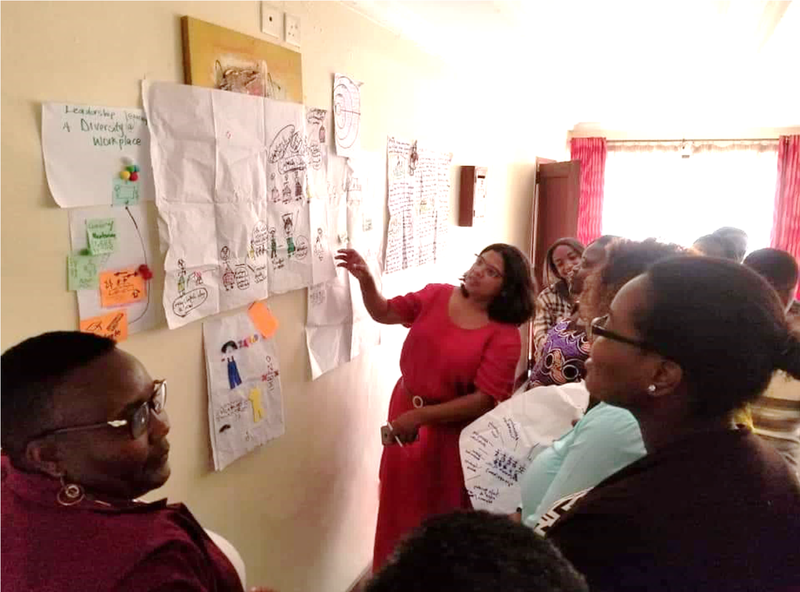GROOTS Kenya, Oxfam International and ILC organized a “Transformative Leadership for Women’s Land Rights” (TLWLR) workshop from the 9th to 12th of December 2019 in Nairobi City, Kenya. Twenty women, involved in ILC Leadership Programme and ILC Women for Women, mentoring and solidarity network, joined the workshop from Malawi, Madagascar, Tanzania, South Africa, Kenya and Uganda.
This is the experience of Irene Mgonja, Programme Officer at the Land and Rights Research and Resource Institute HAKIARDHI, member of the ILC National Engagement Strategy - NES Tanzania.
Transformative Leadership for Women’s Land Rights
The Workshop
The workshop, facilitated by Ms. Rukia Cornelius from Oxfam (South Africa), focused on the presentation of the Transformative Leadership for Women’s Land Rights (TLWLR) manual (produced in the framework of WIDGRA project) and explored the issue of leadership focusing on what a transformative leadership approach entails. As a first step, we participants mapped our individual leadership and activism journeys focusing on opportunities and barriers.
The TLWR framework was presented in the perspective of its possible application into each participant organization: participants had an opportunity to describe how the TLWR could be incorporated in their programs and activities, as well as on individual roles played within the organization.
The training was eye opening as it enabled participants to gain new knowledge on transformative leadership and how it can be incorporated in a variety of projects. It also facilitated experience sharing from various areas of work and on how different actors tackle specific challenges regarding women land rights.
At the end of the workshop participants from GROOTS shared their personal experiences about their participation in TLWLR trainings. They focused on the importance of creating a good team, identifying and creating spaces of participation for women at community level and building upon collaboration with other sensitive actors.

Essentials of Transformative Leadership
During the four-day workshop, participants learned about the essentials of the TWLR and how they can incorporate them in their daily work in land rights and when conducting similar trainings in their organisations and communities.
LEADERSHIP
Reflect on the individual journeys with a specific focus on achievements and challenges, on one’s relationship with the land and other factors necessary to achieve transformative leadership, such as accountability. Be inspired by stories of female leaders to reflect on what makes a good leader be one (qualities of a good leadership).
Gender, sex and gender equality
To be discussed from a social perspective in order to challenge misconstrued perceptions attached to gender and sex, also influenced by patriarchy and gender inequality that exists in most African societies.
Positive changes
Revise and explore changes towards achieving women land rights that took place in different African countries and beyond in order to acknowledge the progress and efforts made.
Barriers
Identify discriminatory norms and practices that prevent (or prevented) individuals from achieving personal and professional goals.
THE 5 PILLARS OF TRANSFORMATIVE LEADERSHIP
Transformative Leadership for women builds around 5 Pillars which are interconnected methods used to achieve specific outcomes:
- individual knowledge of transformative practices, which requires capacity building and trainings
- sustainability of women organisations, networks and platforms; which relies on networking, establishment of partnerships and dedicated forums.
- collaborations to influence social norms and informal decision-making processes; including with men champions for gender equality and power mapping of decision makers
- strategic alliances to influence formal decision-making processes, institutions, policies and their implementation; ensuring involvement of actors coming from different backgrounds.
- promote social accountability, by working on systems that look at women’s land rights and financial opportunities for transformational leadership.
Thinking through change and power
Through a “power walk”, participants reflected on the barriers and challenges that each individual ( and women in particular), face in their private and professional life; and how they vary depending on wealth, gender, religion, social norms and customs and, of course, patriarchy.
The workshop highlighted the importance of thinking through change and power, identifying key factors to produce transformation such as:
- Consciousness: be aware of what is needed and possible, including on budget planning and monitoring, gender disaggregated data and participation of women
- Connection and sensitization of individuals and groups: facilitate access to information and resources, including by overcoming language barrier and raising awareness.

Lessons for transformative leaders
Participants take back home relevant lessons:
- It is crucial to identify priorities during local government budget and planning phase, and engage with relevant authorities in order to ensure key issues are effectively addressed
- Those involved in capacity building activities should become self-reliant and independent,; this will ensure they can transfer knowledge to their communities even beyond a specific project or initiative
- Despite some success in promoting and achieving gender equality in Africa, several forms of gender discrimination and inequality (largely influenced by patriarchal norms and customs) are still to be addressed.
- Self-care of trainers is essential: unwinding, and protecting one’s good mental and physical health allows to perform appropriately and be effective.
- Collaboration among civil organizations and stakeholders with similar goals is necessary in promoting and achieving change
- Implementation of a same or similar project may require different techniques to fit the needs and features of a specific groups or communities.





